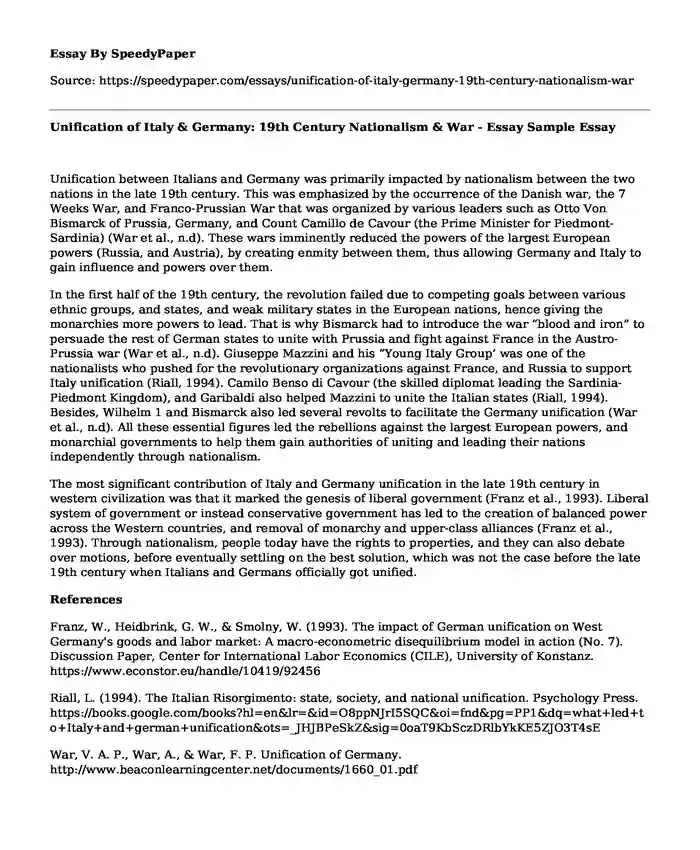
| Type of paper: | Essay |
| Categories: | History Political science |
| Pages: | 2 |
| Wordcount: | 433 words |
Unification between Italians and Germany was primarily impacted by nationalism between the two nations in the late 19th century. This was emphasized by the occurrence of the Danish war, the 7 Weeks War, and Franco-Prussian War that was organized by various leaders such as Otto Von Bismarck of Prussia, Germany, and Count Camillo de Cavour (the Prime Minister for Piedmont-Sardinia) (War et al., n.d). These wars imminently reduced the powers of the largest European powers (Russia, and Austria), by creating enmity between them, thus allowing Germany and Italy to gain influence and powers over them.
In the first half of the 19th century, the revolution failed due to competing goals between various ethnic groups, and states, and weak military states in the European nations, hence giving the monarchies more powers to lead. That is why Bismarck had to introduce the war “blood and iron” to persuade the rest of German states to unite with Prussia and fight against France in the Austro-Prussia war (War et al., n.d). Giuseppe Mazzini and his “Young Italy Group’ was one of the nationalists who pushed for the revolutionary organizations against France, and Russia to support Italy unification (Riall, 1994). Camilo Benso di Cavour (the skilled diplomat leading the Sardinia-Piedmont Kingdom), and Garibaldi also helped Mazzini to unite the Italian states (Riall, 1994). Besides, Wilhelm 1 and Bismarck also led several revolts to facilitate the Germany unification (War et al., n.d). All these essential figures led the rebellions against the largest European powers, and monarchial governments to help them gain authorities of uniting and leading their nations independently through nationalism.
The most significant contribution of Italy and Germany unification in the late 19th century in western civilization was that it marked the genesis of liberal government (Franz et al., 1993). Liberal system of government or instead conservative government has led to the creation of balanced power across the Western countries, and removal of monarchy and upper-class alliances (Franz et al., 1993). Through nationalism, people today have the rights to properties, and they can also debate over motions, before eventually settling on the best solution, which was not the case before the late 19th century when Italians and Germans officially got unified.
References
Franz, W., Heidbrink, G. W., & Smolny, W. (1993). The impact of German unification on West Germany's goods and labor market: A macro-econometric disequilibrium model in action (No. 7). Discussion Paper, Center for International Labor Economics (CILE), University of Konstanz. https://www.econstor.eu/handle/10419/92456
Riall, L. (1994). The Italian Risorgimento: state, society, and national unification. Psychology Press. https://books.google.com/books?hl=en&lr=&id=O8ppNJrI5SQC&oi=fnd&pg=PP1&dq=what+led+to+Italy+and+german+unification&ots=_JHJBPeSkZ&sig=0oaT9KbSczDRlbYkKE5ZJO3T4sE
War, V. A. P., War, A., & War, F. P. Unification of Germany. http://www.beaconlearningcenter.net/documents/1660_01.pdf
Cite this page
Unification of Italy & Germany: 19th Century Nationalism & War - Essay Sample. (2023, Sep 27). Retrieved from https://speedypaper.com/essays/unification-of-italy-germany-19th-century-nationalism-war
Request Removal
If you are the original author of this essay and no longer wish to have it published on the SpeedyPaper website, please click below to request its removal:
- Hawaii Traveling Essay Sample
- Project Management Essay: Crisis at the Jobsite Analysis
- Leo Tolstoy's Role as a Peacemaker - Free Essay Example
- Free Essay. The Critical Analysis of Rightward Bound
- Comparison of the Changes Between the Kaluli and Azande Cultures. Paper Sample
- The First Primates-Summary - Free Essay
- Paper Example: Analyzing IBM Stock Prices: ACF, PACF, and the Quest for Stationarity
Popular categories




